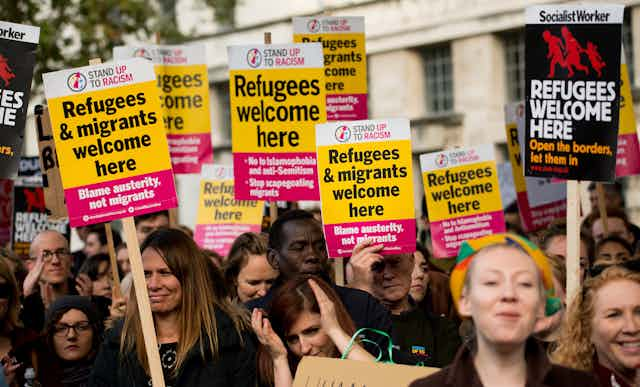In the UK, the world’s fifth richest economy, vulnerable children are being denied education. Asylum seekers and refugee children are struggling to access education – and unable to attend school or college. This contravenes rights to equal educational access in accordance with international human rights law.
I’m currently working on research projects about child refugees, one of which compares experiences of children in the UK with those arriving in Sweden – and I am concerned that the UK education system is not currently fit for purpose or able to provide adequate schooling for every child.
The fact of the matter is that refugee children should be resettled in the UK. It is quite simply the right thing to do for obvious humanitarian reasons. As Ghandi observed:
The true measure of any society can be found in how it treats its most vulnerable members.
Lessons should be learned from countries such as Sweden, where more inclusive practices are already in place. It should also be considered how education policies and practices are working against schools and teachers who want to welcome refugees but who are unable to.
Hassan’s story
Take Hassan, he’s 15 and Iranian, and I met him at an arts workshop for recently arrived child refugees in the UK. Hassan had been in the UK for four months and did not yet have a school place.
His age is the first barrier when it comes to an education. This is because Hassan should be in year 11 – GCSE year – which means a school could be reluctant to take him because he is unlikely to have sufficient preparation time for exams.
Teachers are also under massive amounts of pressure to deliver outcomes to boost their school’s progress scores and performance in league tables. And new arrivals such as Hassan – regardless of their prior attainment and experience – are unlikely to be able to adjust to the English school culture and absorb the content and skills required to pass high stakes examinations in the remaining months of year 11.

The second barrier is language. When we met, Hassan had a friend translating. And until he has a school place, Hassan will be reliant on the support of volunteer groups for English language lessons.
There is another practical barrier, too – Hassan had a letter from his local authority (which he carries with him) saying there are three potential schools for him. But none are near Hassan’s home, and two of the schools are two bus rides away.
Navigating the system
If Hassan isn’t successful in finding a school place in 40 days, his case will appear before what’s known as a Fair Access Panel. This will allocate a place to Hassan and there will be a further period of time when the school can appeal this decision.
Should he find a place, the school, undoubtedly worried about balancing budgets and managing limited resources, will decide which class to put him in, which subjects, and which sets. He might also attend an intervention programme to develop his English and help him access the curriculum, but such places are limited.

More likely, Hassan will be placed in a mainstream classroom and given in-house language support – which will mean withdrawal from some lessons. He will probably also be placed in lower sets because his English will mask his real ability.
These decisions will have short, and maybe, longer term implications for Hassan’s prospects and for the friendship groups he develops.
The Swedish way
But until Hassan gets a school place, he is stuck. He reached the UK but is unable to begin making a new life because he cannot access the support the education system should be able to offer him. And if this is still the case after the age of 16, his experiences are likely to be worse because places in post 16 provision are often even more limited.
But had Hassan landed in Sweden, he and his family would access two hours daily of Swedish language tuition – as part of their residence permit. In school, Hassan would also receive two hours teaching per week in his home language.
This reflects research which shows that when it comes to language learning, a bilingual environment is most successful. This means a child’s first language is continued to enable them to learn a second or third language more quickly.
In Sweden, Hassan’s local school would also commit to enrol him as quickly as possible. Often within a fortnight of arriving in the country.

Like Sweden, schools in the UK should also be inclusive spaces that offer education for all rather than just for league tables. This is important because young refugees are likely to complete their education in their new country – becoming full members of their “post-settlement” society.
So instead of restricting access to education, the UK should instead recognise the potential of these children and welcome them in its schools as they begin their new lives.

